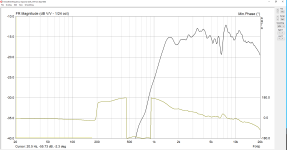Hello, does anyone point me on a Windows XP Vituixcad version? I could only find version 2 that doesn't run on XP. I much appreciate
Thank you, I've been searching for days....It should be around 5Mb, so by mail or by private message: my mail is cucuclock@gmail.com . Thanks a lot!!!
It's also downloadable from official location so no need to waste other resources
https://kimmosaunisto.net/Software/VituixCAD/VituixCAD2.0.85.0_setup.exe
https://kimmosaunisto.net/Software/VituixCAD/VituixCAD2.0.85.0_setup.exe
Sorry if I'm doing something stupid but I,m trying to install on Windows 10 from the official location and I keep getting a Microsoft Defender Smart Screen warning.
Shall I just ignore it ?
Shall I just ignore it ?
Yes, if you have downloaded from official location: https://kimmosaunisto.net/Software/VituixCAD/VituixCAD2_setup.exe. Click More info and Run anyway. This is asked just once. Automatic updates should not ask anymore.Shall I just ignore it ?
I made a comparison of the minimum pahase calculation between ARTA and vituixCAD.
The differences in minimum phase are very big as shown in the attached screenshots, although the magnitudes are the same.
Is there something I could do to make them similar?
The differences in minimum phase are very big as shown in the attached screenshots, although the magnitudes are the same.
Is there something I could do to make them similar?
Attachments
Member
Joined 2003
Frequency response is not the same between the two images, at 1kHz response in VituixCAD is -23dB, ARTA -25.5dB. Make sure exact same window length and type is used between the two software for equal response result, for example ARTA doesn't have an option for left window. Other issue is that the software has to make assumption of response slope beyond measurement range for min phase calculation, so there can be differences there as well. You can use the min phase option in VituixCAD calculator tool to manually define the HF and LF slopes until phase matches ARTA perfectly.
But...What use is min phase for a tweeter? What will you do with this information?
But...What use is min phase for a tweeter? What will you do with this information?
Last edited:
The window length is the same in both cases.
The magnitude response is very close to both cases for f>1.5 kHz.
The question is about the minimum phase. Why is so different?
For example in ARTA the phase is around 0 deg between 5kHz and 10 kHz.
In vituixCAD is from -45 deg at 5kHz to -105 deg at 10 kHz.
Not much changes in Phase when you choose different windows length and type.
The magnitude response is very close to both cases for f>1.5 kHz.
The question is about the minimum phase. Why is so different?
For example in ARTA the phase is around 0 deg between 5kHz and 10 kHz.
In vituixCAD is from -45 deg at 5kHz to -105 deg at 10 kHz.
Not much changes in Phase when you choose different windows length and type.
Member
Joined 2003
...Other issue is that the software has to make assumption of response slope beyond measurement range for min phase calculation, so there can be differences there as well. You can use the min phase option in VituixCAD calculator tool to manually define the HF and LF slopes until phase matches ARTA perfectly.
ok, thanks, that worked. I choose Higher tail 22 kHz and 6dB/oct. Now the minimum phase is close enough for both cases.
But why is so, and how to choose the higher tail correctly?
But why is so, and how to choose the higher tail correctly?
The high tail can be problematic. You can (if possible for your set up) sample at 96 KHz to see what the tweeter is actually doing beyond 20 KHz. Other people (myself included) just use 12 dB/octave as a safe compromise. Of course if you're using a dual channel measurement rig you don't need (or even want) to use minimum phase. The only time I use minimum phase is during preliminary investigations based on manufacturer's data. Even then you have to guess at the drivers' acoustic offset, add baffle step, etc.
Not much, but you really don't have to make them similar because MP extraction is not valuable...mandatory in any phase while designing loudspeakers. As far as I remember ARTA is using DFT for MP calculation. VCAD calculates with Hilbert integral. The last one is very accurate - usually exact match if slope estimation of unknown LF and HF bands is correct.Is there something I could do to make them similar?
Here is one comparison of four phase responses converted from the same IR with the same parameters. Orange phase is original - before conversion from FR to IR.
^Yes, certainly. Minimum phase calculation is based on guessing and assumptions and measured phase is less damaged than magnitude due to time window. Measurement instructions say nothing about MP for measurement data itself which should be quite clear statement about importance.
Totally agree with this.^Yes, certainly. Minimum phase calculation is based on guessing and assumptions and measured phase is less damaged than magnitude due to time window. Measurement instructions say nothing about MP for measurement data itself which should be quite clear statement about importance.
Although in practice, it depends how much error one can expect in the range that really matters.
Which is pretty small relatively speaking, assuming that one crosses around 1-3kHz and/or 200-500Hz.
The deviation of the (combined) SPL above/below those frequencies is just so small that the error is nothing to be really worried about.
Yes, there will always be some exceptions obviously.
But yeah, since the nature of minimum phase is a guessing procedure to begin with, why using it at all in cases you don't need it?
It could only lead to potential problems when you're not aware. Something you always want to avoid.
- Home
- Design & Build
- Software Tools
- VituixCAD

